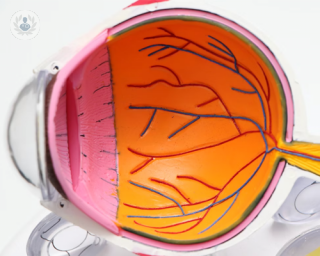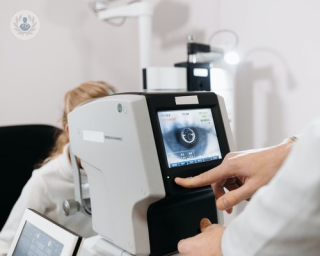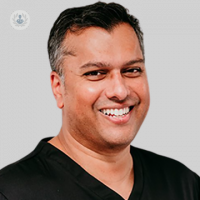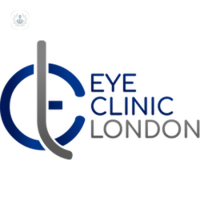What are ICL implants?
ICL implants are a form of corrective surgery for the eyes.
ICL stands for “intraocular collamer lens”. It is an artificial lens that sits behind the pupil and in front of your natural lens, acting as a permanent contact lens. ICLs are also known as phakic intraocular lenses (PIOLs).
ICL implant surgery involves operating on the eye to put this lens into place.

Why are ICL implants sometimes needed?
ICL implants are offered if you have a high glasses prescription or astigmatism and you are under the age of 40. The aim of surgery is to give you 20/20 vision or better and reduce your dependence on glasses or contact lenses.
If you have ICL implant surgery in your 20s or 30s, you may still require further surgery, such as laser eye surgery or refractive surgery later in life, as your prescription naturally changes as you get older.
You may not be suitable for ICL implant surgery if you have problems with your eyes, such as cataracts or glaucoma.
What does the procedure involve?
The procedure involves lying down in a surgical tent while the surgeon looks through a microscope to perform the surgery. You’ll be given some anaesthetic in the eye, both to block any pain and to help your eye stay still during the procedure.
The procedure involves three steps:
- Creating entry points into the eye for the lens implant
- Inserting the lens and letting it unfold into place
- Washing out the eye and closing up the entry points where necessary
In most cases, you’ll need to come into the clinic for two separate procedures, one for each eye. This allows the ophthalmologist to check if the ICL fits the first eye correctly. Some clinics, however, offer to perform the procedure on both eyes in one sitting.
Overall, the procedure takes about 20 minutes per eye.
Aftercare
After the procedure, you can return home straight away. You’ll be given advice on any side effects or complications to watch out for, as well as advice on how to look after your eye.
In particular, it’s important to:
- Wear an eye shield at night (usually for up to a week after surgery)
- Avoid swimming for a week and contact sports for a month
- Wait a few days before driving again
- Use antibiotic and anti-inflammatory drops on a regular basis to help the eye heal well
If you experience pain, redness, or blurriness of vision, you should visit your eye surgeon immediately. You are likely to have a number of follow-up appointments scheduled to review your eye health and progress.
What are the alternatives?
ICL implant surgery is one of a number of options when it comes to corrective surgery. The right procedure depends on your prescription level and age. Other types of corrective eye surgery include:
- Laser eye surgery – commonly offered to patients with lower glasses prescription or without astigmatism
- Refractive lens exchange – generally offered to patients with higher prescriptions over the age of 40
Finally, another alternative is to opt out of surgery altogether and wear contact lenses or glasses. This is a safer option, but may restrict your ability to play certain sports, and may be more expensive in the long run.
04-09-2014 08-24-2023ICL implants
Mr Scott Robbie - Ophthalmology
Created on: 04-09-2014
Updated on: 08-24-2023
Edited by: Carlota Pano
What are ICL implants?
ICL implants are a form of corrective surgery for the eyes.
ICL stands for “intraocular collamer lens”. It is an artificial lens that sits behind the pupil and in front of your natural lens, acting as a permanent contact lens. ICLs are also known as phakic intraocular lenses (PIOLs).
ICL implant surgery involves operating on the eye to put this lens into place.

Why are ICL implants sometimes needed?
ICL implants are offered if you have a high glasses prescription or astigmatism and you are under the age of 40. The aim of surgery is to give you 20/20 vision or better and reduce your dependence on glasses or contact lenses.
If you have ICL implant surgery in your 20s or 30s, you may still require further surgery, such as laser eye surgery or refractive surgery later in life, as your prescription naturally changes as you get older.
You may not be suitable for ICL implant surgery if you have problems with your eyes, such as cataracts or glaucoma.
What does the procedure involve?
The procedure involves lying down in a surgical tent while the surgeon looks through a microscope to perform the surgery. You’ll be given some anaesthetic in the eye, both to block any pain and to help your eye stay still during the procedure.
The procedure involves three steps:
- Creating entry points into the eye for the lens implant
- Inserting the lens and letting it unfold into place
- Washing out the eye and closing up the entry points where necessary
In most cases, you’ll need to come into the clinic for two separate procedures, one for each eye. This allows the ophthalmologist to check if the ICL fits the first eye correctly. Some clinics, however, offer to perform the procedure on both eyes in one sitting.
Overall, the procedure takes about 20 minutes per eye.
Aftercare
After the procedure, you can return home straight away. You’ll be given advice on any side effects or complications to watch out for, as well as advice on how to look after your eye.
In particular, it’s important to:
- Wear an eye shield at night (usually for up to a week after surgery)
- Avoid swimming for a week and contact sports for a month
- Wait a few days before driving again
- Use antibiotic and anti-inflammatory drops on a regular basis to help the eye heal well
If you experience pain, redness, or blurriness of vision, you should visit your eye surgeon immediately. You are likely to have a number of follow-up appointments scheduled to review your eye health and progress.
What are the alternatives?
ICL implant surgery is one of a number of options when it comes to corrective surgery. The right procedure depends on your prescription level and age. Other types of corrective eye surgery include:
- Laser eye surgery – commonly offered to patients with lower glasses prescription or without astigmatism
- Refractive lens exchange – generally offered to patients with higher prescriptions over the age of 40
Finally, another alternative is to opt out of surgery altogether and wear contact lenses or glasses. This is a safer option, but may restrict your ability to play certain sports, and may be more expensive in the long run.


A thorough guide to ICL implants
By Mr Alexander Ionides
2025-01-31
'The permanent contact lenses', implantable Collamer lenses, are a long-term solution to improve eyesight. Highly esteemed London-based consultant ophthalmologist Mr Alexander Ionides discusses implantable Collamer lenses; what the procedure is and what to expect post-operation. See more


ICL implants
By Mr Radwan Almousa
2025-01-28
ICL implants have emerged as one of the best alternatives to glasses and laser surgery. Highly respected consultant ophthalmologist Mr Radwan Almousa is here to tell us more about this procedure. See more


ICL: the advantages of implantable contact lenses
By Mr CT Pillai
2025-01-24
Vision. Perhaps the sense we rely on most to perceive the world is our sight. A variety of problems can affect our eyesight, and to combat these, technology and procedures to treat our eyes are continually advancing. Laser eye surgery is well-known and comes in a number of forms, but another option is that of implantable contact lenses (ICLs). Esteemed ophthalmologist Dr CT Pillai explains: See more
Experts in ICL implants
-
Mr Scott Robbie
OphthalmologyExpert in:
- Cataracts
- ICL implants
- Laser eye surgery
- YAG laser capsulotomy
- Lens replacement (intraocular lenses)
- Refractive surgery
-
Mr Rakesh Jayaswal
OphthalmologyExpert in:
- Cornea
- Cataracts
- Laser eye surgery
- Lens replacement (intraocular lenses)
- ICL implants
- Corneal diseases
-
Mr Sumith Perera
OphthalmologyExpert in:
- Cataracts
- Refractive lens exchange
- ICL implants
- Laser eye surgery
- LASIK
- Refractive surgery
-
Mr Nick Kopsachilis
OphthalmologyExpert in:
- Cataract surgery
- Dry eye
- Laser eye surgery
- Refractive lens exchange
- ICL implants
- Keratoconus
-
Mr Kieren Darcy
OphthalmologyExpert in:
- Lens replacement (intraocular lenses)
- ICL implants
- Keratoconus
- Laser eye surgery
- Cataract surgery
- See all

Laser Vision
Laser Vision
Prema Compass Road North Harbour Business Park Portsmouth PO6 4RP
No existe teléfono en el centro.
By using the telephone number provided by TOP DOCTORS, you automatically agree to let us use your phone number for statistical and commercial purposes. For further information, read our Privacy Policy
Top Doctors

Mount Alvernia Hospital - part of Circle Health Group
Mount Alvernia Hospital - part of Circle Health Group
Harvey Road, Guildford GU1 3LX
No existe teléfono en el centro.
By using the telephone number provided by TOP DOCTORS, you automatically agree to let us use your phone number for statistical and commercial purposes. For further information, read our Privacy Policy
Top Doctors

Eye Clinic London
Eye Clinic London
7 Devonshire St, London
No existe teléfono en el centro.
By using the telephone number provided by TOP DOCTORS, you automatically agree to let us use your phone number for statistical and commercial purposes. For further information, read our Privacy Policy
Top Doctors
-
Laser Vision
Prema Compass Road North Harbour Business Park Portsmouth PO6 4RP, HavantExpert in:
- Cataracts
- Laser eye surgery
- ICL lens implants
- Ophthalmology
- Keratoconus
- Lens replacement
-
Mount Alvernia Hospital - part of Circle Health Group
Harvey Road, Guildford GU1 3LX, GuildfordExpert in:
- Hip
- Cancer
- Cardiology
- General Surgery
- Orthopaedic surgery
- Orthopaedic spinal surgery
-
Eye Clinic London
7 Devonshire St, London, Central LondonExpert in:
- Cataracts
- Laser eye surgery
- Ophthalmology
- Pediatric Ophthalmology
- Dry eye
- Corneal transplant
- See all
- Most viewed diseases, medical tests, and treatments
- Visual impairment
- Diabetic retinopathy
- Retina
- Presbyopia
- Nystagmus
- Myopia
- Hyperopia (farsightedness)
- Eye examination
- Blepharitis
- Astigmatism







